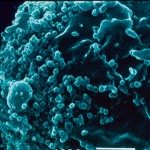Lien vers Pubmed [PMID] – 12023012
FEBS Lett. 2002 May;519(1-3):23-9
Atherosclerosis has many features of a chronic inflammatory disease. To evaluate the role of lipopolysaccharide (LPS), mimicking a systemic infection, we administered the endotoxin to apolipoprotein E (apoE)-deficient mice. LPS injections increase the atherosclerotic lesion size and the titer of plasma autoantibodies directed against oxidized low-density lipoprotein. We found that Th1 and Th2 T cells help the activation of B cells in the autoimmune response. The number of interleukin-4 producing natural killer T cells is highly increased in peripheral blood, liver, spleen and thymus cells, as well as in the atherosclerotic plaque of the LPS-treated mice. Finally, an important adventitial infiltrate of activated lymphocytes, sign of an advanced atherosclerosis, is observed only in the LPS-treated mice. Our results demonstrate that LPS administration aggravates atherosclerosis in apoE-deficient mice. LPS-injected apoE-deficient mice appear to be an excellent animal model to analyze the implementation of new therapeutic approaches in the treatment of atherosclerosis by manipulating immunological effectors.

